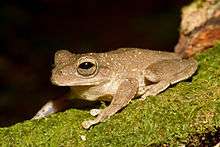Panama cross-banded tree frog
The Panama cross-banded tree frog (Smilisca sila) is a species of frog in the family Hylidae found in the humid Pacific lowlands of southwestern Costa Rica to eastern Panama and in the Caribbean lowlands of Panama and northern Colombia.[2][3][4][5]
| Panama cross-banded tree frog | |
|---|---|
 | |
| Scientific classification | |
| Kingdom: | Animalia |
| Phylum: | Chordata |
| Class: | Amphibia |
| Order: | Anura |
| Family: | Hylidae |
| Genus: | Smilisca |
| Species: | S. sila |
| Binomial name | |
| Smilisca sila Duellman & Trueb, 1966 | |
| Synonyms | |
|
Hyla sila (Duellman & Trueb, 1966) | |
Description
Males grow to 45 mm (1.8 in) and females to 62 mm (2.4 in) in snout–vent length. They are gray, tan or reddish brown in dorsal colouration, with tuberculate skin. White or green flecks as well as darker blotches and markings may be present. Ventral surface is creamy white.[4]
Behaviour
Panama cross-banded tree frogs are nocturnal. Breeding takes place during the dry season when males call from the edges of forest streams. Males call more and using more complex calls on moonlit nights. They also use concealed sites (such as under leaves) less. It is suggested that this is possible because the frogs can detect predatory bats (e.g., fringe-lipped bats) more easily when there is moonlight.[4]
Habitat and conservation
Its natural habitats are lowland moist and wet forests close to shallow rocky pools and stream banks. It can also occur in secondary forest, and sometimes in relatively open areas. Tadpoles live in clear pools and slow-moving water near the bottom.[1]
It is threatened by habitat loss caused by agriculture, illegal crops and pollution resulting from spraying them, logging, and human settlement. It occurs in many protected areas.[1]
References
- Bolívar, W.; et al. (2008). "Smilisca sila". IUCN Red List of Threatened Species. 2008. Retrieved 20 August 2015.CS1 maint: ref=harv (link)
- Frost, Darrel R. (2015). "Smilisca sila Duellman and Trueb, 1966". Amphibian Species of the World: an Online Reference. Version 6.0. American Museum of Natural History. Retrieved 20 August 2015.
- Acosta-Galvis, A.R. (2015). "Smilisca sila Duellman & Trueb, 1966". Lista de los Anfibios de Colombia V.05.2015. www.batrachia.com. Retrieved 20 August 2015.
- "Smilisca sila Duellman and Trueb 1966". Amphibians of Panama. Smithsonian Tropical Research Institute. Retrieved 20 August 2015.
- "Smilisca sila". Biodiversidad de Costa Rica. Instituto Nacional de Biodiversidad. Retrieved 20 August 2015.
